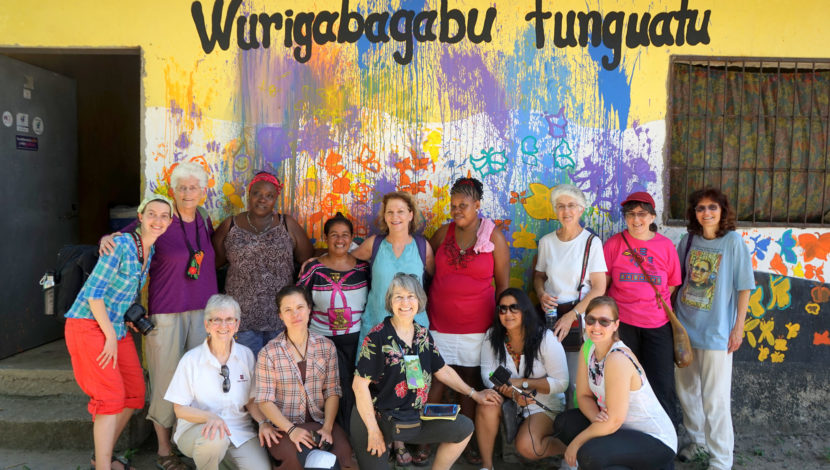The Unitarian Universalist Service Committee advances human rights through grassroots collaborations.
Defending Land and Lives in Honduras

By on June 4, 2018
“As women are defending the earth and the land, we also have to defend the territories of our own bodies.” This is how Noemí Dubón described her work, seated next to Carolina Sierra and Andrea Paz. The three women are leaders in the Honduran women’s organization Foro de Mujeres Por la Vida (“Foro”), which has partnered with UUSC for the past two years.

They welcomed my Unitarian Universalist Service Committee (UUSC) colleagues and me to their office in San Pedro Sula on Monday, May 21. There, we joined their staff around an altar dedicated to martyrs of women’s and human rights movements in Honduras, including Berta Cáceres and Margarita Murillo – two women murdered while leading struggles to protect the lands of indigenous people and small farmers (photo courtesy of Mark Coplan). Over the next hour, Noemí, Carolina, and Andrea informed us about the perils of being a human rights defender in Honduras, as well as the solidarity with other women that gives them strength to keep working for justice.
We were in Honduras as part of a solidarity delegation organized by the SHARE Foundation. However, our immediate purpose was to accompany UUSC partner Radio Progreso as they returned home after a multi-city U.S. tour to raise awareness about the human rights crisis in Honduras and the complicity of the U.S. government in the violence.
Because of the dangers facing human rights defenders in Honduras—including specific threats against our partners—it was crucial that U.S.-based supporters like UUSC join Radio Progreso on their return. Once in Honduras, we met with other human rights leaders, like Foro. In all cases, we wanted to convey a message to the Honduran and U.S. governments: We are with our friends and we will know if you allow harm to befall them.
During our meeting with Foro, their leaders told us about the reality of systemic violence facing women and human rights defenders in Honduras. They informed us that as many as 96% of crimes committed against women are never penalized and that their own colleagues and friends have been murdered or disappeared.

In one especially disturbing case, Norma Yolanda, a leader in one of Foro’s member organizations, was abducted while nursing her infant child at home in 2010. The men who took her were dressed as security forces, and identifying themselves as Honduran government authorities. Despite working for eight years to find answers about her disappearance, Foro still doesn’t know where Norma was taken or whether she is alive.
The dangers that women and human rights defenders face in Honduras are inseparable from the violation of ancestral and indigenous land rights—in many cases linked to U.S.-backed development projects. In another meeting convened by the SHARE delegation, we heard from leaders in two Garifuna (Afro-Honduran) communities who are fighting eviction and dispossession of their traditional lands to make way for tourist resorts. One of the Garifuna-led organizations we met with, Mariposas Libres, is a member of the Foro network. The women of Mariposas Libres described to us how the development of a new beach-front hotel has deprived them of access to the coast and degraded the natural environments that are essential to their livelihoods.

For Foro de Mujeres and their allies, the women’s struggle is always two-fold: defending the land and the integrity of their own bodies.
This struggle continues in the face of patriarchy reinforced by the power of the state. Foro staff described how, when confronted with reports of femicide (the killing of women because they are women) or other human rights violations, authorities often reply that the women ought to have stayed at home with their children. They described how police and military officers have used sexual violence as a weapon of war against female protesters and rights defenders and how women who have been sexually assaulted by security forces sometimes go to report the crime and find the perpetrator at the police station. They added that they have been slandered as “murderers” for speaking out against the criminalization of women who seek abortions, which is completely banned in Honduras without exception.
Even as sexist violence and speech are ingrained in the power structures of Honduras, the human rights movement offers a very different vision of women’s roles. Women’s leadership is central to the whole social movement in Honduras, across its many sectors. Leaders and martyrs like Caceres and Murillo are looked to and honored as defenders not only of women, but of entire communities and ways of life that are menaced by the twin forces of militarism and neocolonialism.
As Foro’s Executive Coordinator Carolina Sierra told us during our meeting, “What we do is we love each other and we take care of each other. We grow together. We hold in our minds those who have been murdered and disappeared because they give us the example of their struggle and their sacrifice, their martyrdom inspires us to continue so they will not be forgotten.”
In these moments and throughout our time in Honduras, the words of Sweet Remember, a poem by Carmen Tafolla echoed in my mind. After describing extreme torture Central American women experienced during the death squads of the 1980s, she ends with the following lines:
this is why
I do not ask
my child to cry
to sit sweet helpless and be cute
to always need a male escort
to think that only he protects,
not she, herself, and not she, him
to think herself so delicate
so weak …
But I will teach her
quite instead
that she is her own brave life
till dead
and that there are no guarantees in life
nor rights
but those that we invent
and that the bravest thing of all
to think, to feel, to care, and to recall
is to be human
and to be complete
Click here to read part two. All photos courtesy of Mark Coplan.